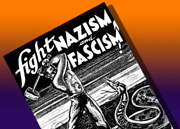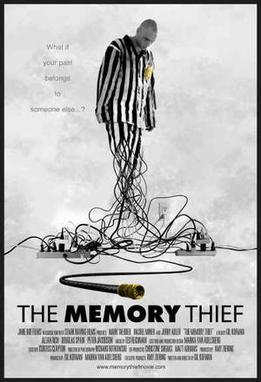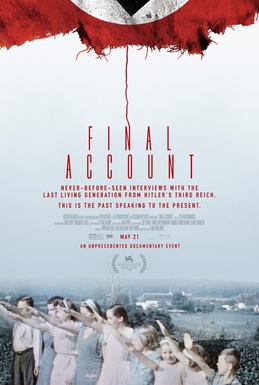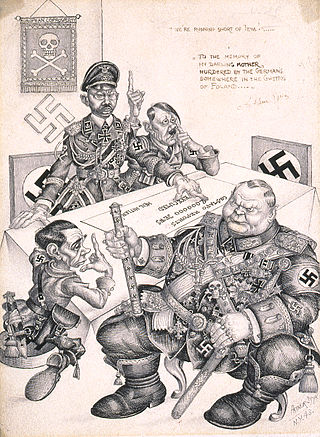
Shoah is a 1985 French documentary film about the Holocaust, directed by Claude Lanzmann. Over nine hours long and 11 years in the making, the film presents Lanzmann's interviews with survivors, witnesses and perpetrators during visits to German Holocaust sites across Poland, including extermination camps.
This is a selected bibliography and other resources for The Holocaust, including prominent primary sources, historical studies, notable survivor accounts and autobiographies, as well as other documentation and further hypotheses.

Thomas "Toivi" Blatt was a Holocaust survivor, writer of mémoires, and public speaker, who at the age of 16 escaped from the Sobibór extermination camp during the uprising staged by the Jewish prisoners in October 1943. The escape was attempted by about 300 inmates, many of whom were recaptured and killed by the German search squads. Following World War II Blatt lived in Communist Poland until the Polish October. In 1957, he emigrated to Israel, and in 1958 settled in the United States.

The March of the Living is an annual educational program which brings students from around the world to Poland, where they explore the remnants of the Holocaust. On Holocaust Memorial Day observed in the Jewish calendar, thousands of participants march silently from Auschwitz to Birkenau.
Max Frankel is an American journalist. He was executive editor of The New York Times from 1986 to 1994.

Richard Glazar was a Czech-Jewish inmate of the Treblinka extermination camp in German-occupied Poland during the Holocaust. One of a small group of survivors of the camp's prisoner revolt in August 1943, Glazar described his experiences in an autobiographical book, Trap with a Green Fence: Survival in Treblinka (1992).

Gerda Weissmann Klein was a Polish-born American writer and human rights activist. Her autobiographical account of the Holocaust, All But My Life (1957), was adapted for the 1995 short film, One Survivor Remembers, which received an Academy Award and an Emmy Award, and was selected for the National Film Registry. She married Kurt Klein (1920–2002) in 1946.

My Opposition: The Diaries of Friedrich Kellner is a 2007 documentary television film about an orphaned American who went in search of his German grandfather and discovered a secret diary written during the time of the Third Reich. The film is a production of Abella Entertainment Ltd. of Toronto, Canada, co-produced and co-directed by Arnie Zipursky and Fern Levitt, with executive co-producer Leonard Asper of CanWest Global. The film is distributed by CCI Releasing.

They Were Not Silent is a documentary about the Jewish Labor Committee's anti-Nazi movement in the United States before, during and after World War II. The film features rare archival footage and photographs along with interviews with labor veterans, Holocaust survivors and scholars. It explores how international Jewry worked to help Jews and non-Jews in Germany, Poland, and elsewhere in Europe.
The JLC's role has changed over the years. A trade unionist who has focused on JLC history, Kenneth Burt, says he hopes that the documentary will encourage new interest in the organization.

The Memory Thief is a 2007 American independent drama film. It was written and directed by Gil Kofman and features Mark Webber and Rachel Miner in the leading roles. The film chronicles the experiences of a young man who becomes involved in documenting the experiences of survivors of the Holocaust, as his commitment turns into obsession and madness. The film, which was Kofman’s feature debut as a feature director, was shot on DV. Critical reviews of the film were generally favourable.

Gerhard "Gad" Beck was an Israeli-German educator, author, activist, resistance member, and survivor of the Holocaust.

Imaginary Witness: Hollywood and the Holocaust is a 2004 documentary film directed by Daniel Anker and narrated by Gene Hackman that examines the treatment of the Holocaust in Hollywood films over a period of sixty years and the impact of the films on public perception and thinking, and vice versa. The film was originally produced for the American cable network, American Movie Classics.

180 is a 2011 American anti-abortion documentary short film produced by New Zealand evangelist Ray Comfort, founder of Living Waters Publications. The film is self-distributed by Living Waters on DVD and has been posted publicly on the group's official website and channel. The film is notable for comparing abortions to the Holocaust.

Stations of the Elevated is a 1981 documentary film by Manfred Kirchheimer about graffiti in New York City. It debuted at the New York Film Festival. It was re-released June 27, 2014, and shown at the Brooklyn Academy of Music and was re-released throughout the United States in the fall of 2014.
Manfred Alexander Kirchheimer was an American documentary film maker and professor of film at the School of Visual Arts in New York City. He previously taught at NYIT. He was born in Saarbrücken, Germany, and his family moved to New York City in 1936 to escape Nazi Germany. After receiving a B.A. from the City College of New York in 1952, he worked primarily as a film editor and he also began making his own films. A major theme in many of his documentaries is urban life. His most notable documentaries include: Stations of the Elevated, We Were So Beloved, Tall: The American Skyscraper and Louis Sullivan, and Art Is... The Permanent Revolution.
Dimensions in Testimony is a collection of 3D interactive genocide survivor testimonies, produced by USC Shoah Foundation in order to preserve the conversational experience of asking survivors questions about their life and hearing responses in real time, therefore preserving history through first-person narrative.

Final Account is a 2020 German-language documentary film directed and produced by Luke Holland, who died shortly after post-production was completed on June 10, 2020. The film follows the last living generation of German participants in Adolf Hitler's Third Reich.

There are several major aspects of humor related to the Holocaust: humor of the Jews in Nazi Germany and in Nazi concentration and extermination camps, a specific kind of "gallows humor"; German humor on the subject during the Nazi era; the appropriateness of this kind of off-color humor in modern times; modern anti-Semitic sick humor.

The U.S. and the Holocaust is a 2022 three-part documentary miniseries about the United States' response to the Holocaust. The series was directed by Ken Burns, Lynn Novick, and Sarah Botstein, and was written by frequent Burns collaborator Geoffrey C. Ward.















